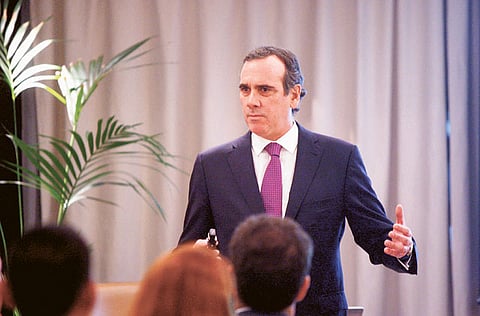Big boom expected for ‘blended' MBA programmes
But applications have decreased in countries affected by continuing economic crisis

Dubai: Technology has made huge inroads in the way MBA programmes are delivered around the world these days. This is especially true in the Executive Masters in Business Administration (EMBA) arena, which is seeing a boom in ‘blended' programmes, says Professor Gonzalo Garland, director of International Development at Instituto de Empresa (IE) Business School in Madrid, Spain.
These blended learning programmes, a mix of online and face-to-face, could overtake traditional full-time EMBA programmes as senior executives and managers will not be away from their jobs for significant amounts of time, he said.
Garland visited Dubai last week to meet prospective students and IE Business School alumni based in the UAE.
Technology's role
Garland said the role of technology was overestimated in the early 1990s and when the technology bubble burst, so too did people's expectations about its impact.
But since the 1990s, technology has revolutionised MBA programmes, allowing business schools to have a global reach and diverse cohorts of students.
"In general we're seeing a big boom in blended programmes for special types of programmes but we don't believe in pure online programmes where students use the online material and take a test at the end of the programme. Our model is high quality blended programmes," said Garland.
At IE Business school, for example, Global EMBA students would spend a week or two with faculty in Spain, China, USA and Brazil. While in their home countries they complete assignments and interact with faculty and fellow students online. "This combination of face-to-face and online is no different at all from full-time students," said Garland.
Several universities have adopted this model in recent years and others have shown resistance, he said. In the US and Canada there is still a preference for traditional programmes and in other countries online education is associated with low quality programmes although this is changing.
Blended learning also suits younger generations of students. "We think younger generations work this way because they find information online all the time. They also don't have to leave their jobs but still have access to a very global education."
Garland said 30 years ago full-time business school programmes could only attract people from the region due to the cost and time factor. With blended programmes and the influence of globalisation students are from around the world.
‘Eye-opening experience'
"Everybody wants to know about emerging countries in Asia, Africa and Latin America and blended learning allows an eye-opening experience."
The prolonged economic crisis in the West has caused firms to reduce their expenditure on education, says Garland. "Some of them are less willing to allow their employees or managers to go out of the country for long periods of time, therefore blended programmes are very convenient."
The crisis has also affected course content. There is more emphasis on the ethics of business because "while we want to produce people who are good in finance and accounting, we also want to produce people who are open to change, can think out of the box and are innovative."
When the global recession hit, many employees chose to return to university to complete MBAs and ride out the storm. Universities are now seeing a drop in applications as economic instability continues indefinitely.
"The crisis in the developed world has been significantly longer than others and people are nervous about doing an MBA now." However education is different from other sectors, he says, and applications will eventually pick up again.
Sign up for the Daily Briefing
Get the latest news and updates straight to your inbox
![Sharjah to pilot UNESCO’s ECCE-PATT tool, highlighting its leadership in early learning systems. [Illustrative image]](http://media.assettype.com/gulfnews%2F2026-02-08%2F3mxn16n8%2Fchild.jpg?w=320&auto=format%2Ccompress&fit=max)

